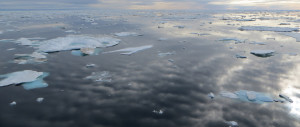 Back in 1990, as the debate over climate change was heating up, a dissident shareholder petitioned the board of Exxon, one of the world’s largest oil companies, imploring it to develop a plan to reduce carbon dioxide emissions from its production plants and facilities.
Back in 1990, as the debate over climate change was heating up, a dissident shareholder petitioned the board of Exxon, one of the world’s largest oil companies, imploring it to develop a plan to reduce carbon dioxide emissions from its production plants and facilities.
The board’s response: Exxon had studied the science of global warming and concluded it was too murky to warrant action. The company’s “examination of the issue supports the conclusions that the facts today and the projection of future effects are very unclear.”
Yet in the far northern regions of Canada’s Arctic frontier, researchers and engineers at Exxon and Imperial Oil were quietly incorporating climate change projections into the company’s planning and closely studying how to adapt the company’s Arctic operations to a warming planet.
Ken Croasdale, senior ice researcher for Exxon’s Canadian subsidiary, was leading a Calgary-based team of researchers and engineers that was trying to determine how global warming could affect Exxon’s Arctic operations and its bottom line.











